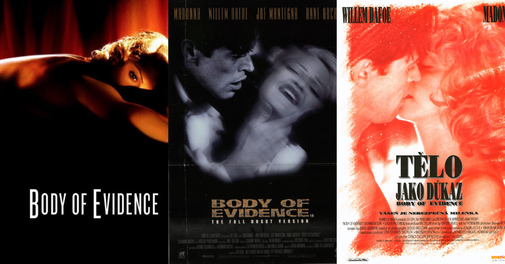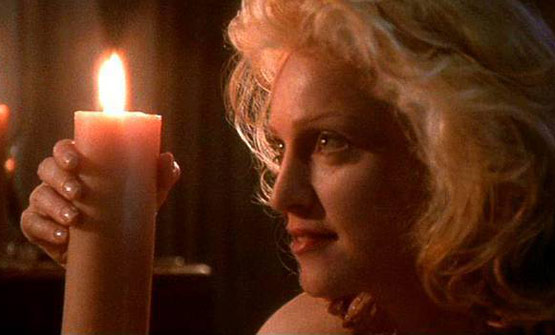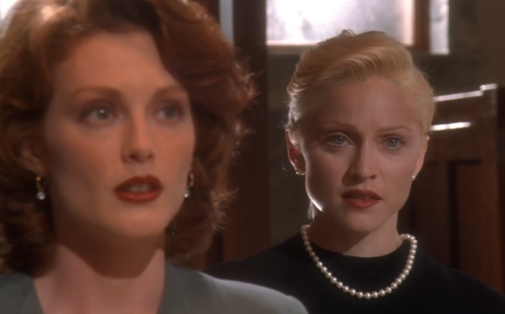by Seán McGovern

Madonna is a lot of things: Singer. Mother. Grammy Winner. Cosmetics Magnate. She is also a “movie killer”. But Body of Evidence, which turns 25 this week, is not entirely her fault. Nor, sadly, is it camp enough, ludicrous enough or, really, bad enough for the opinion of it to have changed after all these years.
Body of Evidence arrived at a particular nexus of Madonna's career. Riding on the wave of Like A Prayer, pushing boundaries with the Blonde Ambition Tour and the exuberant Truth or Dare, Madonna's imperial phase began to dip with her boundary-pushing take on sex and erotica; namely, SEX and Erotica. While Madonna would remain unapologetic, Body of Evidence, and the accompanying explicit period in career concluded with one of the most consistent criticisms of Madonna: rigid-perfectionism and managed-spontaneity...
Now it's at this point that I make it clear that, even if it seems otherwise... I'm a huge Madonna fan.
The most grating problem with Body of Evidence is how reductive derivative it is. Released a mere 8 months after Basic Instinct, it's shocking to see how much of it feels directly lifted from it and other films of its genre. Basic Instinct invites its own particular criticisms all these years later, though it sideswipes many thanks to its ridiculously taut plot, sleek direction by Paul Verhoeven and by how amazing Sharon Stone is. She's as compelling in her line readings as she is with her resting-maniac-face. But where Body of Evidence really differs is in its complete lack of awareness. Body of Evidence thinks it's an erotic thriller. It's not. It's an erotic procedural.
And that's just one of its problems.
Madonna plays Rebecca Carlson: A woman who indulges in a healthy dose of kink in her sex life, which sadly reaches unhealthy levels when her rich boyfriend dies. Found dead wearing nipple clamps, the police turn to the woman who can be seen all over his home movies, gyrating on top. Enter the only lawyer who will help her, Dulaney, played with all the sensuality of a velociraptor by Willem Defoe. The charge? With a heart condition cocaine in his system and a will of $8m, our victim must have been knowingly boned to death by this blonde bombshell.
Basic Instinct required you to suspend disbelief at many turns. Catherine Trammell had to have been a shapeshifting time-traveller to pull of some of the stunts she did (or didn't?) do, and yet one of the most unbelievable moments was that sweater Michael Douglas wore in the nightclub scene. The film succeeded because of the commitment by the talent involved. Sharon Stone has never shaken Catherine Trammell because she was too damn good being bad. Body of Evidence, not without an abundance of its own plot devices, fails to suspend your disbelief, but also because you just don't really care. Catherine Trammell was a best-selling author of taudry thrilller...Madonna does, what, exactly? She lives on a houseboat full of paintings and yet this was what preoccupied me more than how she got away with murder. She also finds it easy to move around with acupuncture needles in her back, which I can attest is not a good idea.
And then of course, there's those infamous sex scenes. Regularly appearing on lists of “worst sex scenes in cinema,” Rebecca Carlson likes it a little bit rougher than even Catherine Trammell, eschewing Hermes scarves for handcuffs.

Have you ever seen animals make love, Frank? It's intense. It's violent. But they never really hurt each other”
Cue the candle wax. Body of Evidence, at the very least, features Willem Defoe going down on Madonna as she stands on the roof of a car. It's not all penetration. There isn't an ice-pick in sight.
It's interesting to consider the backlash to Madonna's sexuality at this time. You can take her side and say that the world is/was a puritanical small town afraid of a woman's unabashed sexuality, and you'd be damn right. But you can also posit that Madonna's attitude to sex is her attitude to a lot of things: that she's going to micro-manage everything while saying FUCK YOU to consensus. This era in her career felt less like a project and more like a provocation. But in 1993, we didn't have the words “sex-positive” and “slut-shame”, and that's a sign of the time. But over the last 25 years the vocabulary in which we can openly talk about sex has changed. For all the rank unpleasantness in uncovering the abuses of powerful men, the majority of us have discovered that navigating consent can ultimately be a joyous and equalising experience. Parity between consenting adults has made us less fearful of sex, in all its many shades. Madonna was always two steps ahead of everyone else, and most of us are still challenging the authority that she casually shook off years before.
So is Body of Evidence worth revisiting? It is in the sense that it represents the downturn of a subgenre that included quality films like Fatal Attraction (1987) and The Last Seduction (1994). Or worth revisiting if you're an Anne Archer completist: witness a wrong turn following her Fatal Attraction Oscar nomination. Perhaps the best thing about it is the young Julianne Moore, her spirited love-making with Willem Defoe and her star-wattage visible every time she's on screen, even if the material is completely undeserving.

But ultimately, Body of Evidence is a reminder that elsewhere in the early 90s, sexual acts considered “transgressive” by the majority were still decimating huge chunks of our population. Fear shuts down a conversation, just as silence equals death.
Cinema is deserving of sex. Body of Evidence, however, remains a bad film. But ask me again in another 25 years.